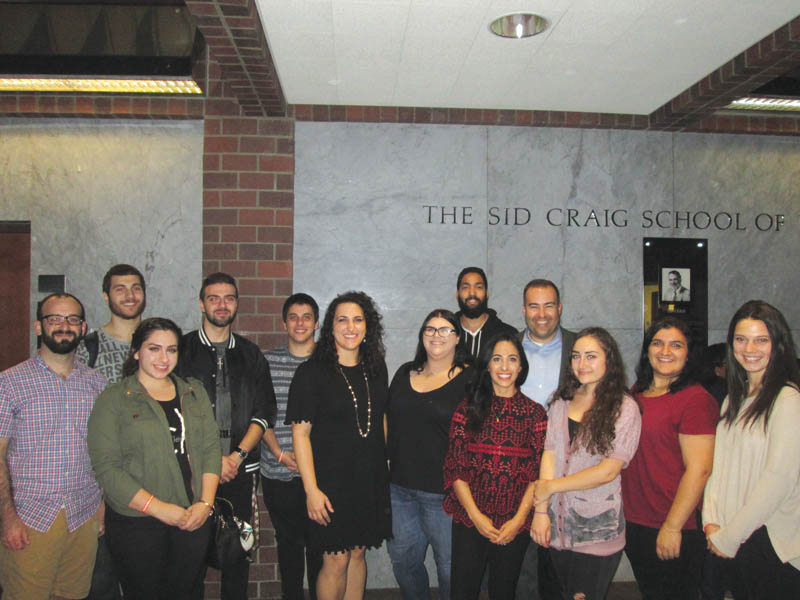
Photo: Barlow Der Mugrdechian
Michael Rettig
Editor
The potential for reconciliation between Armenians and Turks seems distant given Turkey’s century-long denial of the deep wounds it inflicted on the Armenian people. Though the Turkish government remains constant in its policy of denial, a growing number of Turkish citizens have reexamined their government’s position on the Armenian Genocide over the past decade. In 2014, a group of Turkish and Armenian Christian pastors gathered in the United States to discuss the barriers dividing their people and the potential for reconciliation on the foundation of their shared faith. The Turkish pastors spoke to several Armenian congregations in California, asking for forgiveness for what their people did in 1915. Out of this meeting emerged the Armenian Turkish Peace Initiative (ATPI).
On Tuesday, October 3, the Armenian Studies Program hosted a panel discussion, “Armenians and Turks: Challenges and New Paths Forward Towards Reconciliation” to explore the theme of forgiveness and reconciliation between Armenians and Turks. The panel was chaired by Dr. Jay Pope, Associate Professor of Psychology at Fresno Pacific University, and included Kathleen Chavoor-Bergen, a school therapist in the Fresno Unified School District; Noelle Daoudian Nightingale, a conflict resolution trainer; and two Turkish pastors from the ATPI, who will be referred to by the pseudonyms Matthew and Paul, because of concerns for their safety when they return to Turkey.
Dr. Pope opened the panel by providing a theoretical background to the concept of forgiveness. Chavoor-Bergen and Nightingale followed with their unique perspectives on trauma and reconciliation. The panel concluded with a discussion between Dr. Pope, the audience, and the Turkish pastors.
In his introduction, Dr. Pope examined definitions of forgiveness and the implications they carry. He noted that the topic of forgiveness has been largely understudied in the field of Psychology, as the first book that received widespread attention on the topic was not published until 1984. Dr. Pope stressed that although forgiveness is an intangible social construct, its importance is in the effect it has on people.
“It is one thing to say ‘I forgive you,’” said Dr. Pope, “it is an entirely different thing to assess whether that is having a measurable effect on your life.” Dr. Pope noted research is revealing that the act of forgiving has numerous health benefits to those who practice it, while refusing to forgive one’s perpetrator induces stress, cardiac illnesses, and various other harmful manifestations. He argued that forgiving the Turkish people does not mean Armenians need to give up their desire for justice and recognition, only the bitterness they feel towards Turks. Forgiveness thus restores humanity to the Turkish people in the hearts of Armenians, without minimalizing the crime of genocide.
Chavoor-Bergen similarly stressed the role forgiveness has in not only the process of self-healing, but also in preventing trauma from being perpetuated. According to Chavoor-Bergen, severe trauma could alter one’s DNA on a molecular level and thus be transmitted to future generations. She argued that it is important for Armenians to focus inwardly, as a culture and as individuals, in order to process trauma in a healthy manner.
Nightingale urged the audience to evaluate their attitudes towards Turks. “Hostility will hinder well-intentioned Turks from addressing the issue of the Genocide. Through forgiveness we can change the response of our oppressors.” According to Nightingale, political initiatives are unlikely to bring peace between Armenians and Turks as long as there is animosity between people on the ground. Turkish and Armenian grassroots efforts are thus necessary to advocate for reconciliation and build future relationships. “Changing the hearts and minds of Turkish citizens is the only way to attain recognition, begin reconciliation, and sustain peaceful relations.”
The ATPI is one such organization dedicated to mending the divide between Turks and Armenians. Pastor Matthew first became aware of the Armenian Genocide when he was studying in England in the 1970s. It was there that he became a Christian, which altered his worldview.
When the Armenian Secret Army for the Liberation of Armenia (ASALA) started to assassinate Turkish diplomats, Matthew began to wonder what their motives were. Matthew, who was exposed to books in England that were not permitted in Turkey, began to read about the Armenian Genocide for the first time. “It was painful to realize my ancestors could have done such inhumane things to the people they had lived with for centuries.”
Pastor Paul’s childhood as a Kurdish Alevi (religious sect) helped him understand the Armenian issue. Paul recalled growing up fearful of government sponsored persecution of Alevis. His parents warned him not to tell anyone he was Kurdish or Alevi. “We grew up with the sense that being different in Turkey is not easy, so when I first heard about the Armenian issue, it wasn’t a surprise.”
While the Armenian issue was not discussed during Matthew’s schooling in Turkey, Paul remembered being taught that Armenians betrayed the Turks and were thus “defeated.” However, Paul’s parents and other local Turks described the Armenians as good neighbors and hard workers. “While Turkish Christians used to be the minority in Armenian churches, Armenian Christians are now the minority in Turkish churches. I would love to have more Armenians in my church so they can be an example to the Turks with their forgiveness, commitment to Christ, and steadfastness in the face of suffering.”
Both Paul and Matthew consider Armenians the forbearers of their faith and appreciate the warm reception they have received in Armenian-American congregations. It takes these personal relationships—built upon commonalities, such as religion—to bridge the deep schism between Armenians and Turks, thus paving the way for reconciliation on a larger scale.
 Hye Sharzhoom Armenian Action
Hye Sharzhoom Armenian Action